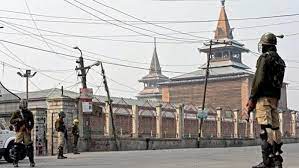The managing body of the Jamia Masjid on Friday said that the authorities have disallowed “Jummat-ul-vida” congregational prayers at the historic mosque.
“District magistrate and police officials visited jama Masjid in the morning at 9.30 am and asked the management to lock the gates of the Masjid as administration had decided that jummat-ul-vida prayers will not be allowed at the Masjid,” said Anjuman Auqaf Jama Masjid in a statement.
“Anjuman strongly resents this move of the authorities causing great distress to lakhs of Muslims who traditionally come from all parts of the valley to offer prayers on the last and greatly blessed Friday of Ramzan in Jamia Masjid where offering prayers on last Friday has great significance,” the statement added.
The recent decision by the authorities to disallow ‘Jummat-ul-Vida’ prayers at Srinagar’s Jama Masjid has caused disappointment and concern among the local Muslim community. ‘Jummat-ul-Vida’ is a special Friday prayer that holds significant religious and cultural importance for Muslims, especially during the holy month of Ramadan.
The decision to disallow the ‘Jummat-ul-Vida’ prayers at Jama Masjid has been met with disappointment because it is seen as a restriction on the religious freedom of the local Muslim community. Jama Masjid is a historic mosque in Srinagar, Kashmir, and holds great religious significance for the local Muslim population. The disallowance of the prayers at such an important mosque has been seen as a denial of the community’s right to practice their faith freely.
Moreover, the decision has also raised concerns about the impact on the cultural fabric of the region. ‘Jummat-ul-Vida’ prayers at Jama Masjid have been a long-standing tradition, bringing people from all walks of life together in communal prayers, fostering a sense of unity and togetherness among the local Muslim community. The disallowance of these prayers may disrupt this cultural tradition and have an adverse impact on the social cohesion of the region.
It is important for the authorities to understand the significance of ‘Jummat-ul-Vida’ prayers at Jama Masjid and the importance of upholding the rights of the local Muslim community to freely practice their faith. While considerations of security and public safety are important, any restrictions on religious practices should be balanced and based on genuine concerns.
It is essential for the authorities to engage in meaningful dialogue with the local Muslim community and address their concerns. This can involve finding alternative solutions that ensure both security and the rights of the community to practice their faith, such as increased security measures during the prayers or other ways to manage the situation effectively.
In conclusion, the disallowance of ‘Jummat-ul-Vida’ prayers at Srinagar’s Jama Masjid has caused disappointment and concern among the local Muslim community. It is important for the authorities to understand the religious and cultural significance of these prayers and work towards finding solutions that uphold both security concerns and the rights of the community to freely practice their faith. Meaningful dialogue and engagement with the local community can help in finding a balanced approach that respects the religious and cultural diversity of the region.




